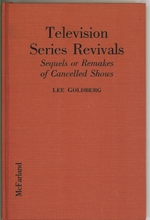I got this email from an aspiring TV writer today:
I’ve written a few solid spec teleplays and one good feature, and moved to LA and tried to make contacts and all the other things you’re supposed to do. I am, however, a teacher and not a PA or writer’s assistant, so making the right contacts is a little difficult for me.
My main interest is in television. A friend who works at a managment firm that rarely deals with TV writers recently told me I should start querying agents with my TV specs. How do I do that? I could write a feature query cold, for all the good it does anybody, but how do you write one for television? You can’t exactly use a logline to generate interest since you didn’t come up with the stories. Is my friend right? Would an agent even be interested in reading teleplays? Thanks for any advice you could give.
I honestly didn’t know how to answer her, so I asked a few TV writer friends of mine for their opinions. One of them said:
I would tell her to get a list of ALL the agencies (available through
the WGA) and send out a letter of introduction to each one stating her
objective. I would also include in the letter that she has several
specs available which sends the message she’s serious about this.
Obviously if there’s anything in her background that can set her apart
(awards, short film produced, Jim Brooks read and liked my script,
etc.) that would be a plus. If she sends to forty agencies and three
reply she’s ahead of the game.
Another TV writer/producer suggested much the same thing:
My best advice would be to show your TV specs (assuming they’re well-written
and not outdated) to anybody who will read them, including your friend at
the management agency that doesn’t do television. If the work is really
good, it will be passed along to managers and agents who are looking for TV
clients – especially hungry junior agents.
Also, send out the dreaded cold letters, but target them well. Find out who
represents the writers who currently work on the shows you like. The WGA
will tell you if you ask. Then send a letter to that person’s agent,
describing how you aspire to follow in the path of great writers like
(insert successful client here), and have two fabulous specs which will make
it easy for the agent to sell you. I did this when I first started looking
for an agent – didn’t work, but I did get some reads.
But another writer/producer friend disagreed:
it’s hard for me to imagine a good agent would read a spec TV script unless s/he
knew the writer personally or the script was recommended.
As for networking, one of my writer/producer buddies suggested:
Start attending WGA events, stay for the reception
afterwards and mingle your heart out. Ask other writers who represents them
and how they got signed. And don’t overlook my favorite: UCLA Extension
classes.
Believe it or not, hanging out with other aspiring writers is actually a good way to make contacts in the business. Many of my producer-friends today are people I hung out with at TV show tapings and Museum of Broadcasting events twenty years ago. I’ll give you another example, One of the writers we hired on MISSING, who had no previous produced credits or script sales (but a killer spec and a great personality) was part of a screenwriting group at a Barnes & Noble. When she got on staff of our show, all those people in the group suddenly had a "friend in the business," someone who could tell them, from first-hand experience, what the dynamics of a writers room were like, what kinds of specs the producers were reading, etc.
If you’re interested in attending a UCLA Extension class, my friend Matt Witten, a writer/producer on HOUSE, is teaching an introductory TV writing class this spring and I’ll be teaching one this summer.



